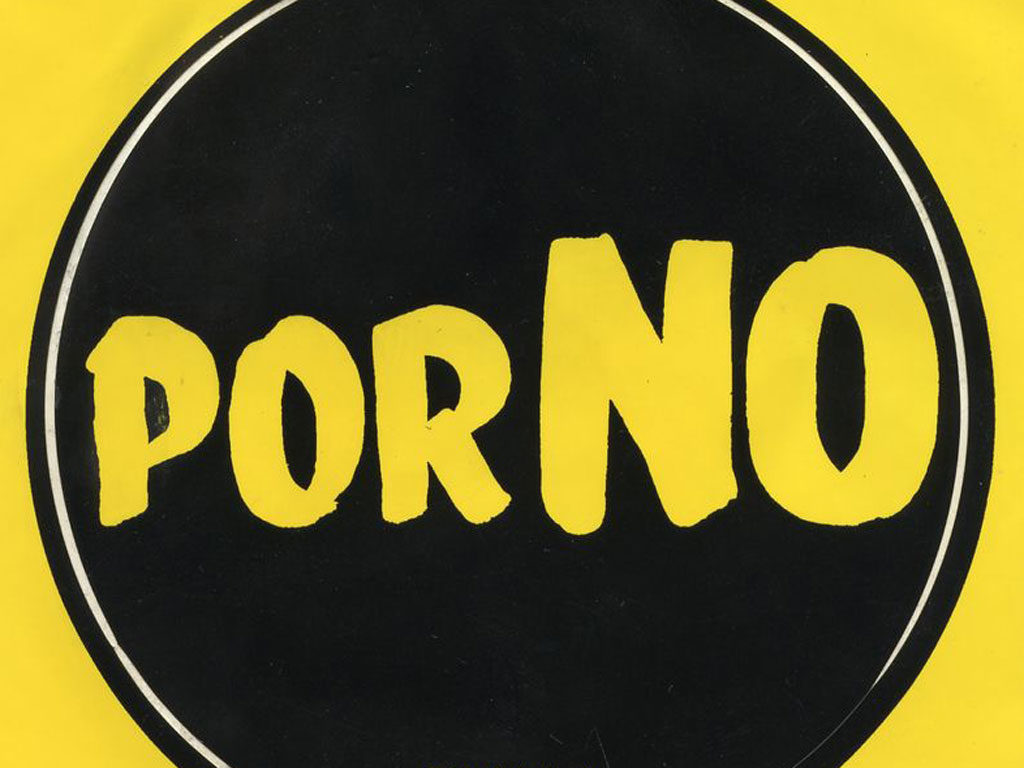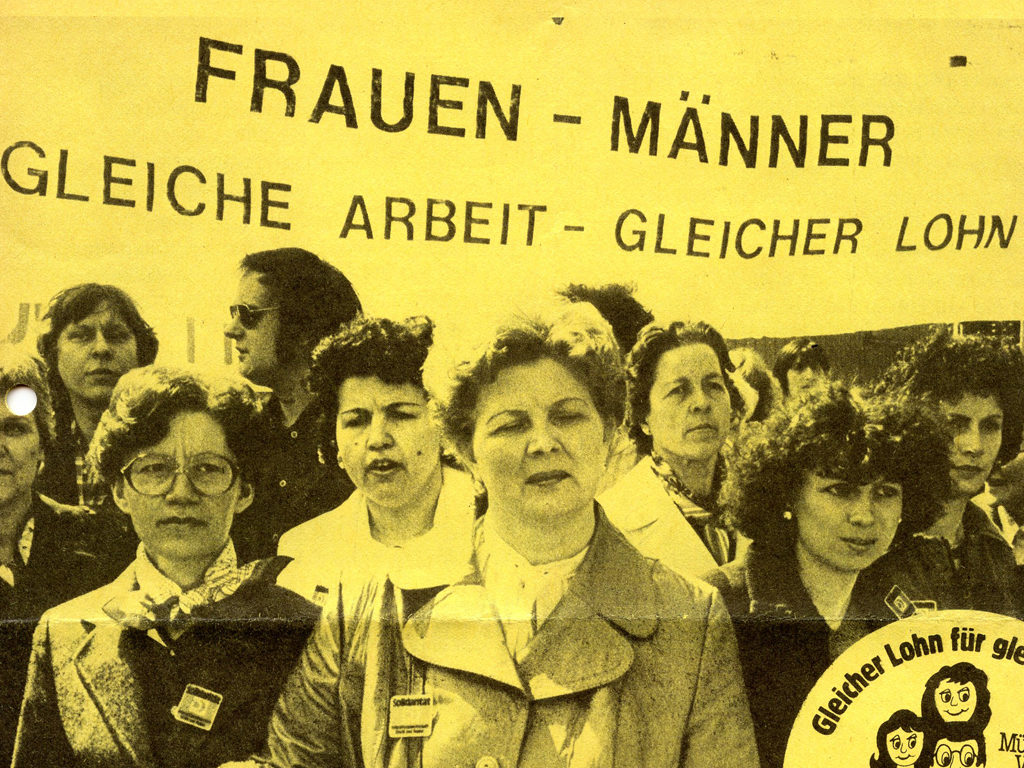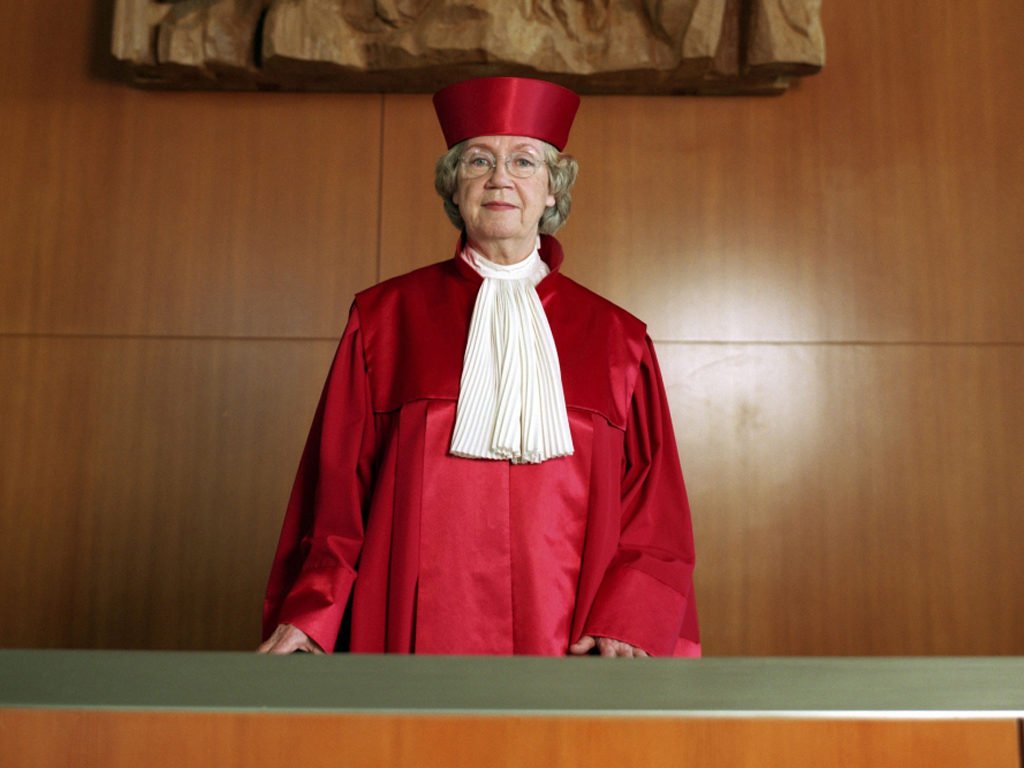For some, it is “the oldest trade in the world” – for others, a violation of human dignity that must, like slavery, be abolished (in the English-speaking world, prostitution is sometimes called ‘white slavery’). Prostitution has been controversially debated in the name of feminism since the beginning of the New Feminist Movement: autonomous feminists like Simone de Beauvoir, Kate Millett, or Alice Schwarzer have criticised the System Prostitution and its treatment of women as commodities as inhumane. They have shown solidarity with prostitutes. Left-wing feminists have often argued that prostitutes ‘voluntarily’ choose the profession; according to them, ‘prostitution is a job like any other’. The controversy is still raging today.

1971: World’s First Conference on Prostitution
Feminists in the United States organise the world’s first conference on prostitution, which is to take place in New York City in December. Prostitutes – even those without an invitation – take part, and a debate on the contrary views about the abolition of prostitution is sparked.1 While some feminists see prostitution as an expression of the object-status of women and of unlimited male access to an ever-available female body and call for its abolition, another group of feminists characterises prostitution as an expression of sexual freedom, emphasising what they see as the ‘voluntary nature’ of prostitution. This fundamental conflict will pervade the entire debate over the coming decades.
1972: Results of a Study – “Unfavourable Childhood”
The sociologist Dorothea Röhr from the Psychosomatische Klinik der Universität Gießen publishes a study about the careers, self-assessment, and daily lives of 98 prostitutes who she had interviewed in Frankfurt in 1969.2
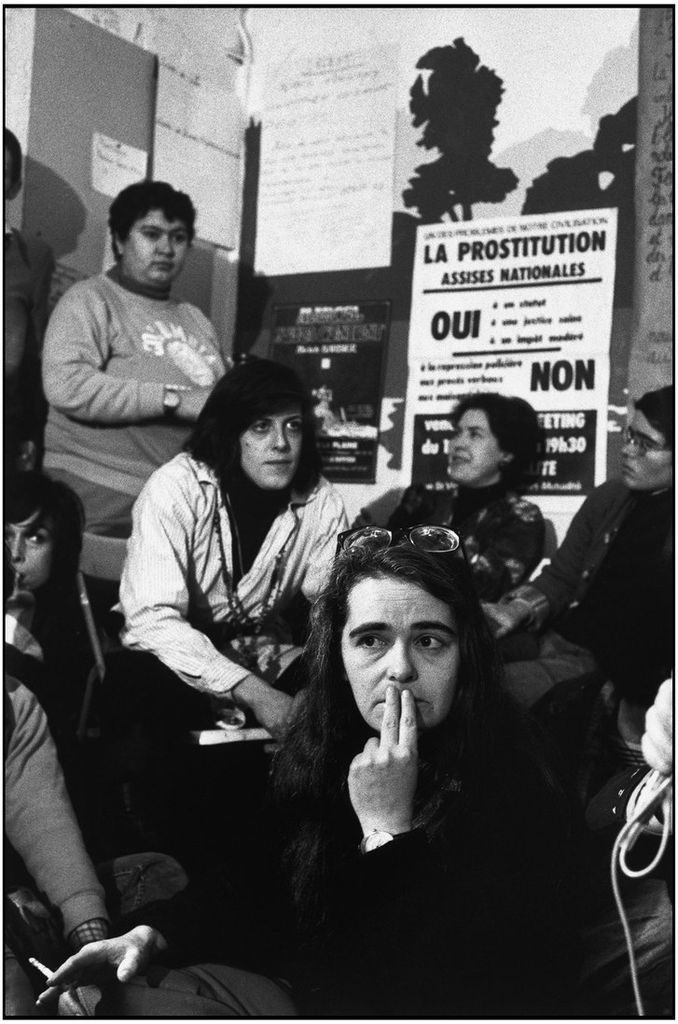
The Spiegel reports in detail about Röhr’s findings in the 42nd issue of the magazine (1972): the majority of the women interviewed had “the most unfavourable childhood imaginable” and do not like their profession, but insist that they exercise it voluntarily. The sociologist describes the interviewees as “victims and simultaneously active participants”.3
1973: The Prostitution Papers by Kate Millett
Kate Millett’s The Prostitution Papers: A Quartet for Female Voice (1971) is published in Germany as Das verkaufte Geschlecht: Die Frau zwischen Gesellschaft und Prostitution. Millett: “It seems to me that prostitution is somehow paradigmatic, somehow the very core of the female’s social condition. It not only declares her subjugation right in the open, with the cash nexus between the sexes announced in currency, rather than through the subtlety of a marriage contract […], but the very act of prostitution is itself a declaration of our value, our reification. It is not sex the prostitute is really made to sell: it is degradation. And the buyer, the john, is not buying sexuality but power, power over another human being [….] But at the same time the bargain is struck, and the very fact that it can be demonstrates the relative position of male and female […].”4
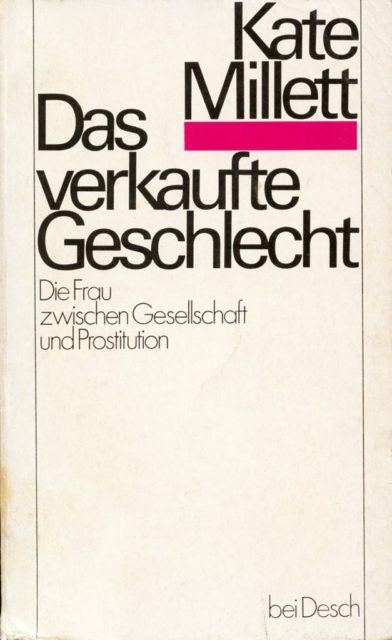
24 November 1973: § 138 – ‘Immoral’ but not Criminal
Over the course of reforming the legislation governing sexual offences, the criminal offense of procuring – or ‘pimping’ – is rewritten. Up to this point, those guilty of pimping were found to “wholly or partially subsist on the earnings” of a prostitute or to “offer protection or otherwise support a woman out of habit or self-interest related to the practice of prostitution”. After the legislative reform, a pimp is someone who “exploits another person who practices prostitution”. This “exploitation” is difficult to prove – i.e., only possible with the testimony of the affected woman.5
Prostitution is not punishable by law in the FRG, but it falls under the category “immoral” in § 138 of German civil code: “A legal transaction that violates good morals is void.” Prostitution legislation is not reformed. In the GDR, prostitution was officially prohibited from 1968; however, it existed in secret regardless, albeit to a much lesser extent.
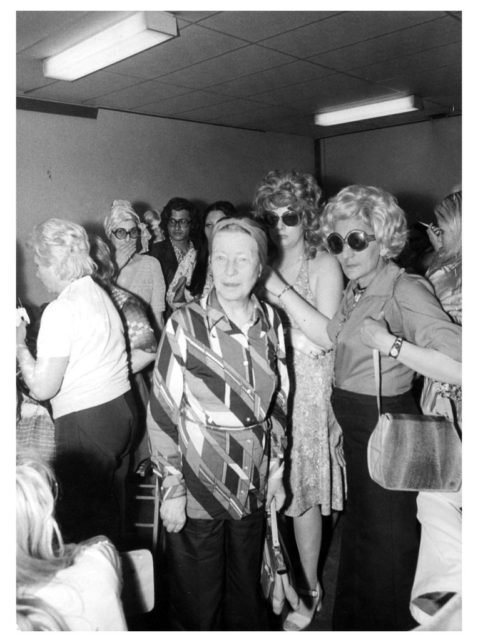
2 June 1975: Protest Against Arbitrary and Double Standards
Feminists and prostitutes occupy the Church of Saint-Nizier in Lyon. Around 150 women protest for ten days against arbitrary police action and society’s double standards, which hold prostitutes in contempt while respecting punters as honourable citizens.6 Furthermore, the women complain that the state on the one hand criminalises them, but levies taxes against them on the other. In other European countries and in the USA, prostitutes also begin to defend themselves against society’s double standards.
1977: Resolution of Decriminalisation and Elimination of Police Records
At the Berliner Sommeruniversität für Frauen a workshop on the subject(s) Prostitution – Sexualität – Hausarbeit is held, organised by the feminist magazine Courage in the context of their campaign Lohn für Hausarbeit.
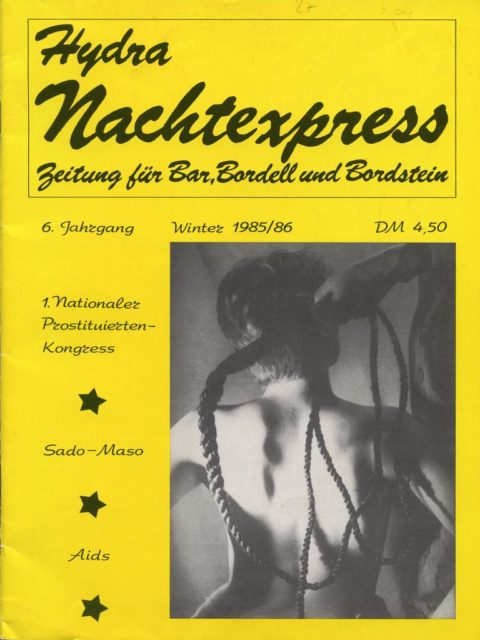
More than 300 participants, among them many prostitutes, pass a resolution in support of decriminalisation and the elimination of police records on prostitutes. Their demands are to be presented in November of the same year at a women’s conference in Houston as part of the UN International Women’s Year.7
1979: Fallstudien by Daniel Christoff and its Controversy
On 19 November, ZDF televises the film Fallstudien by Daniel Christoff which portrays, among other things, a housewife and a 15-year-old girl’s route(s) into prostitution. The film is the subject of media controversy. The Spiegel lambastes the film, which thematises the womens’ abuse during childhood and the pimps’ brutality, as a “superficial, cliché-ridden Kiez-revue.“8 Courage publishes an article by Pieke Biermann, which describes the film as “propaganda” that aims to make viewers “afraid of the ‘milieu’ […] so that they don’t get the idea to earn their money in this way because prostitution is, after all, still the most highly paid female profession”.9
1980: Hydra, Pieke Biermann and An der Front des Patriarchats
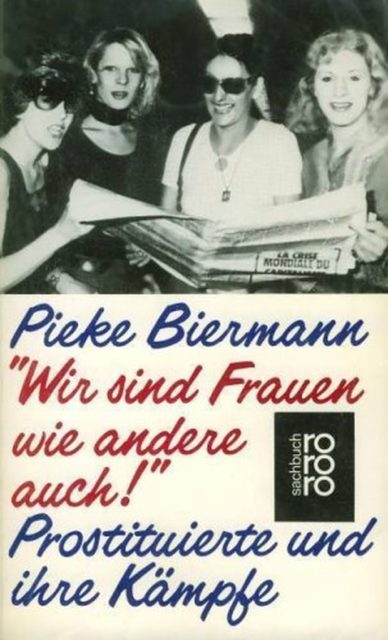
Social workers, psychologists, and doctors involved with the local public health office in Charlottenburg, Berlin set up the project Hydra as the first “autonomous whore’s organisation”.10 Hydra sees itself as a counselling centre for prostitutes, and from 1980 to 1995 publishes the magazine Hydra Nachtexpreß – Zeitschrift für Bar, Bordell und Bordstein.11 On the principles of the project, Hydra comments: “We are not a project that aims to help women leave prostitution. Our goal is the recognition of prostitution as a profession and the elimination of social and legal discrimination.”12 From 1985, Hydra receives public funding from the city and the federal government.
Pieke Biermann publishes Wir sind Frauen wie andere auch. The student and casual prostitute asks: “Which woman is not actually a prostitute?” Biermann had interviewed four women working as prostitutes for the book. She argues that all female sexual activity within patriarchal marriage is essentially prostitution and accepting money for sex is therefore only the next logical step: “Is there really such a big difference between having sex for food and lodging, or for cold, hard cash?”13 According to Biermann, this money is ultimately the path to liberation from the Sklaventum der Frau, from woman’s enslavement. Alice Schwarzer counters in EMMA: “The emancipation of whores isn’t what is up for debate, but rather the stigmatization of emancipation.”
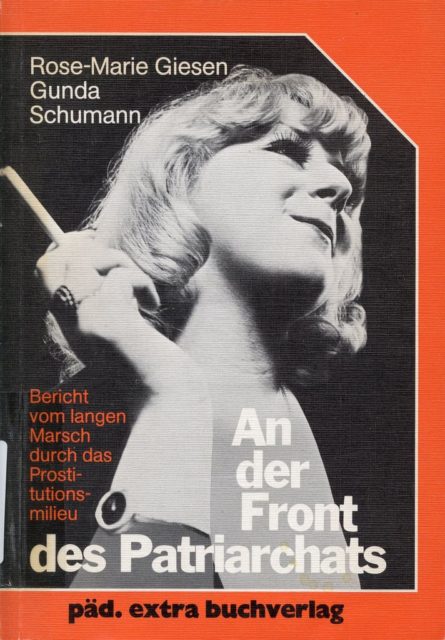
A little later the book An der Front des Patriarchats by Rose-Marie Giesen and Gunda Schumann is published. The sociologists interviewed 20 prostitutes in West Berlin in person and in writing. Their conclusion: “Prostitution is neither an expression of the ‘nature’ of gender roles nor an epiphenomenon, but rather the most obvious and at the same time most subversive expression of women’s suppression in our patriarchal society.”14
8 July 1980: The So-Called „Pimp Case“
In Grenoble, France the verdict is read in the so-called “Zuhälterprozess”, or “pimp case”. For the first time in France’s judicial history, four prostitutes united to form an interest group and sued their pimps for damages. The women were violently forced into prostitution, and their profits were withheld by the pimps. They are successful. The ten defendants are sentenced to between two and ten years in prison and must pay the women a total of 750,000 Francs in compensation. One of the plaintiffs states: “The truth is that the majority of us have pimps who use all means at their disposal to get us to walk the streets.”
October 1980: Does Prostitution Set Free? Prostitution Does Set Free! – taz vs. EMMA
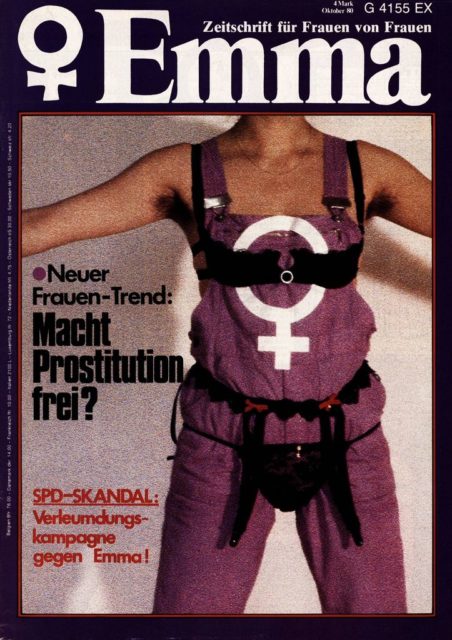
EMMA asks Macht Prostitution frei? – does prostitution set you free? – and thus responds to an article of the same name in the taz.15 The taz had published an interview with a 30-year-old short-term prostitute (“committed to her own as well as other women’s emancipation”) who claims: “You get a crazy sense of power. Men come across to you as pathetic, ridiculous, little wimps afterwards.” The taz receives letters from readers that denounce the calibre of the newspaper’s reporting and its romanticisation of prostitution. EMMA ironically responds: “Prostitution macht frei! A wife isn’t doing anything different than a prostitute, therefore we can all hook for money! – With touching simplicity, new theories on prostitution are presented that, to make matters worse, also call themselves feminist.” And EMMA complains: “Early feminist solidarity with prostitutes has evolved into pseudo-liberal complicity with the profiteers.”
1983: AGISRA – Against Sex Tourism and Trafficking in Women
![Frauenhandel und Prostitutionstourismus. Arbeitsgemeinschaft gegen Internationale Sexuelle und Rassistische Ausbeutung (AGISRA) [Hrsg.]. - München: Trickster-Verl., 1990 (FMT-Signatur: SE.15.037) Frauenhandel und Prostitutionstourismus. Arbeitsgemeinschaft gegen Internationale Sexuelle und Rassistische Ausbeutung (AGISRA) [Hrsg.]. - München: Trickster-Verl., 1990 (FMT-shelfmark: SE.15.037)](http://frauenmediaturm.de/wp-content/uploads/2018/08/Agisra_Frauenhandel_und_Prostitutionstourismus-640x466.jpg)
1984: HWG, Bufas and Other Initiatives of Prostitutes
The initiative Huren wehren sich gemeinsam (HWG) is established in Frankfurt, based on the Berlin-based Hydra. HWG sees itself as a pro-prostitution self-help and public relations project and publishes the Zeitung für leichte und schwere Mädchen.18 Other similar initiatives soon follow – Kassandra in Nuremberg, Nitribitt in Bremen, or Lysistrata in Cologne. These initiatives will – if they haven’t disbanded – later organise as the Bündnis für Fachberatungsstellen für Sexarbeiterinnen und Sexarbeiter (Bufas). The Bufas calls for the parity of “sex work” with other professions and the elimination of all “discriminating special provisions”.
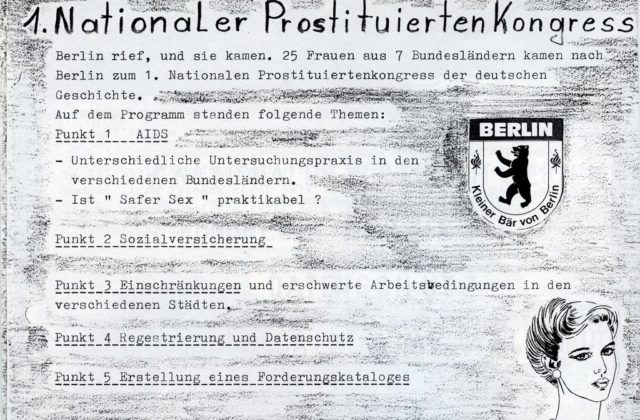
October 1985: FirstNational Prostitute Congress
The first Nationaler Prostituiertenkongress takes place, organised by Hydra in Berlin. 25 women from seven West German states take part and discuss subjects like AIDS, safe sex, registration, and the protection of prostitutes’ personal data.19
1988: First Hurenball
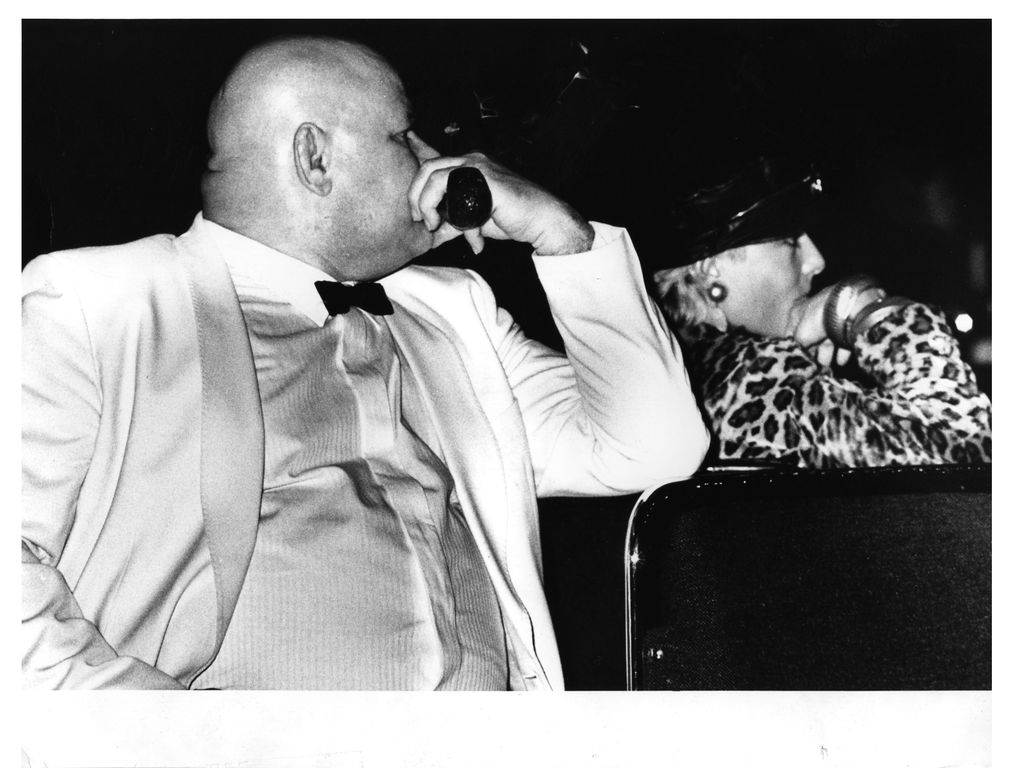
Hydra organises the first German Hurenball in Berlin; one of the organisers is board member Pieke Biermann. The media covers the ball, and criticism is voiced by other sex worker organisations – e.g., the ball is too expensive at 150 D-Mark per ticket, Hydra just wants to make a name for themselves, Hydra is betraying their base.20 Punters and pimps are guests as well.
5 March 1990: ‘Profession Whore’
Frauenpolitik – a Green parliamentary working group – presents a Gesetzentwurf zur Aufhebung der rechtlichen Diskriminierung von Prostituierten at the conference Beruf: Hure.21 According to the draft legislation, the “profession whore” should be given legal parity with other forms of gainful employment and become an “Ausbildungsberuf”, i.e., a skilled occupation requiring training.22 According to Frauenpolitik, the opponents of this standpoint are denying “a share of their own whoredom”.
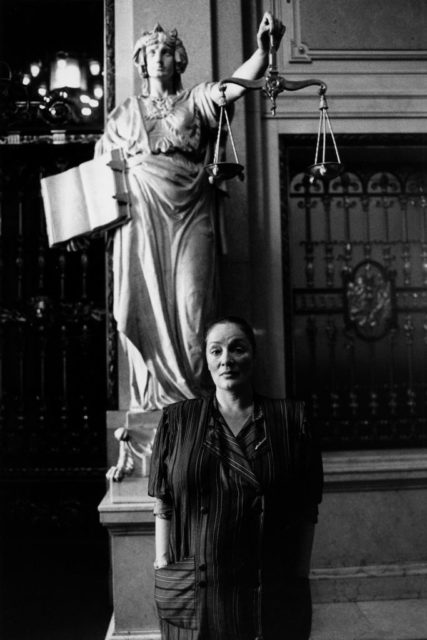
1999: Law Against Purchaising Sexual Services
Under pressure from feminists, Sweden passes the so-called ‘Sexkaufverbot’ – a ban against purchasing sexual services – with votes from the Conservatives, Social Democrats, and Greens: under this law, prostitutes are completely decriminalised and punters who create the market that treats women as commodities in the first place are punished. The law is part of the legislative package Kvinnofrid [‘peace for women’], which aims to curb violence against women. In Sweden, the purchase of another person’s body is considered to be an expression of the patriarchal imbalance of power between men and women and a violation of human dignity. In the following years, more and more European countries follow Sweden’s example: Norway, Iceland (both in 2009), Northern Ireland (2015), France (2016). In Ireland, a bill has been submitted that would criminalise the punter.
What Happens Next?
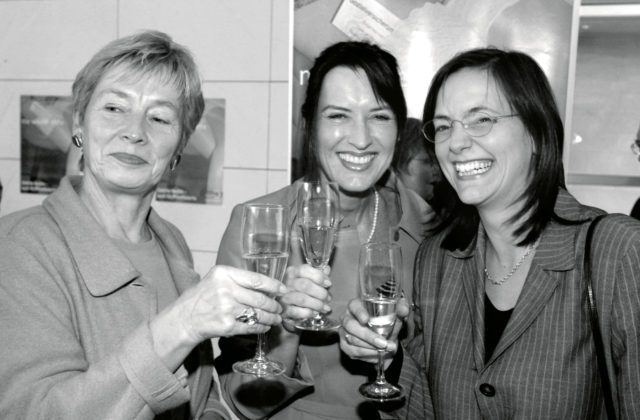
Germany takes a different approach. Two years after the Netherlands, which abolished a previously existing brothel ban and fully legalised prostitution in 2000, the Gesetz zur Regelung der Rechtsverhältnisse der Prostitution comes into force in Germany on 1 January 2002. This prostitution law, implemented by the SPD/Green-led government, completely reverses the ‘immorality’ clause. Both countries declare the legalisation of prostitution a priority; they hope that in future this will enable prostitutes to claim pension, health, and unemployment insurance as well as knock the bottom out of criminality in the milieu. Feminists, including EMMA, warn that the law ignores the daily reality of the majority of women working as prostitutes and chiefly benefits the profiteers of prostitution: brothel owners, pimps, sex traffickers. With respect to the growth of the EU in the East, there is concern that traffickers will find the perfect conditions for their business with Ware Frau [‘woman-as-commodity’] in countries with deregulated prostitution markets. Soon thereafter, almost 80% to 90% of women working as prostitutes will be Eastern European, among them many Sinti and Roma.
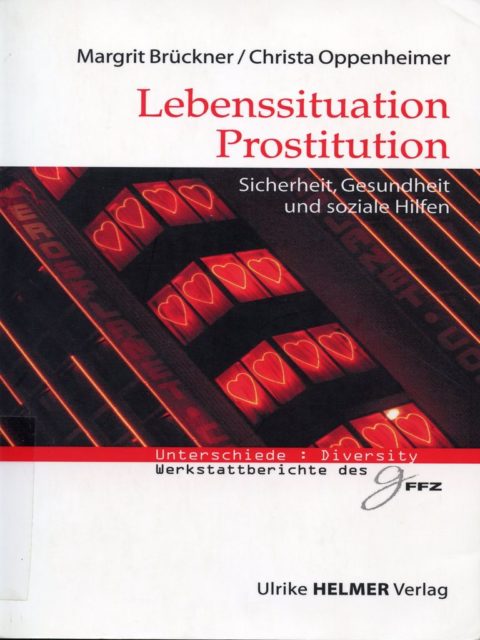
In 2006 the Europäische Frauenlobby (EWL), – umbrella organisation of 2,500 women’s organisations from across 30 countries – launches the campaign Together for a Europe Free from Prostitution. The only EU women’s organisation that does not support the campaign is the Deutsche Frauenrat, an association of more than 55 German women’s societies and groups, among them denominational and party-political groups.
In 2007, an evaluation of the SPD/Green prostitution law from 2002 by the Ministry of Women’s Affairs shows that the objectives of the law have not been met.23
In 2010, the conference of the German ministers of the interior calls on the legislator to carry out an urgent revision of the 2002 reform. As a result of the liberalisation of prostitution law, the police have few opportunities to tackle the “highly criminogenic environment”.24
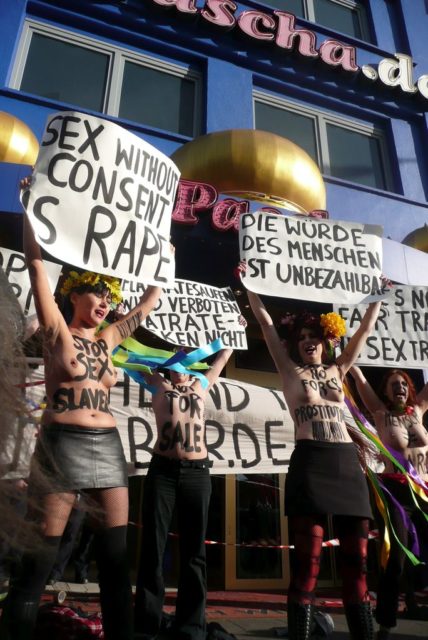
In 2012, the Netherlands declares the liberalisation of prostitution to have failed. Studies have shown the following: in state-licensed brothels, up to 90% of the women working do so under pressure from pimps. This also applies to the world-famous window prostitution in Amsterdam’s ‘entertainment district’ De Wallen.25
The EMMA-book Prostitution – Ein deutscher Skandal26 is published with Kiepenheuer & Witsch (KiWi) in 2013. “How could we become a paradise for sex traffickers?”, asks the publisher Alice Schwarzer. Prostitutes – from Domenica to the Eastern European women forced into prostitution – talk about their experiences. Journalists report from brothels, from the Pascha (Cologne) and the Paradise (Stuttgart) to Pattaya (Thailand). Critics of prostitution analyse the fatal role played by the prostitution lobby with its ‘sex workers’ and politics.
EMMA launches the campaign Prostitution abschaffen! Around 100 celebrities – authors, actresses, politicians etc. – are the first signatories, and a further 12,000 people sign the appeal. After the parliamentary elections, EMMA wants to initiate a debate on the social respectability of prostitution in Germany and to put pressure on politicians, who have not taken any measures to reform the prostitution law to date, despite alarm bells ringing.
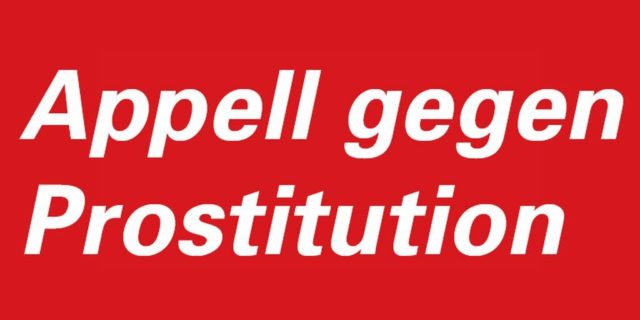
Soon thereafter, the prostitution lobby speaks out, led by the trade association Berufsverband erotische und sexuelle Dienstleistungen (BesD) that had formed in October 2013 in response to the EMMA campaign. The lobby’s aim is the further deregulation of prostitution. The BesD is supported by the Bündnis für Fachberatungsstellen für Sexarbeiterinnen und Sexarbeiter (Bufas). Bufas-member Hydra states: “Probably Hydra’s and the German whore movement’s greatest success was overturning the immorality of prostitution in Germany with the 2002 ‘prostitution law’, at present the most important victory after years of political work.”27
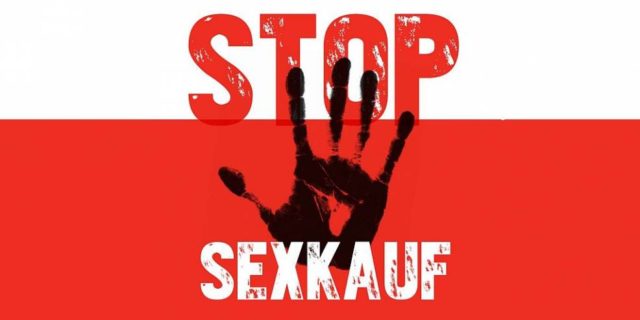
In contrast to EMMA, which understands prostitution as a violation of human dignity and demands a law based on the Swedish model, another fraction on the feminist scene – centred around the pop-culture magazine Missy, the blog Mädchenmannschaft, and the hash tag #aufschrei – adopts the pro-prostitution lobby’s standpoint. This group characterises prostitution as ‘sex work’ and perceives ‘sex workers’’ real problem to be not the work itself, but the social stigma. Missy not only reports in this spirit, but is also the co-founder of events at which representatives of the pro-prostitution lobby speak.
In February 2014, the EU Parliament passes the report Sexuelle Ausbeutung und Prostitution und ihre Auswirkung auf das Geschlechterverhältnis28 and with a two-thirds majority declares: “Prostitution is contrary to the principles of the Charter of Fundamental Rights of the European Union, including the goal and principle of gender equality.” Even so-called ‘voluntary’ prostitution “reduces all intimate acts to their monetary value and diminishes the human being to the level of merchandise or an object to be used by the client”. Prostitution is “intrinsically linked to gender inequality in society” and has “an impact on the status of women and men in society and the perception of their mutual relations and sexuality”.29
In April 2014, the Council of Europe joins in calling on “all member states to consider the criminalisation of buying sex, based on the Swedish model, as the most effective measure in the fight against the trafficking of human beings.”
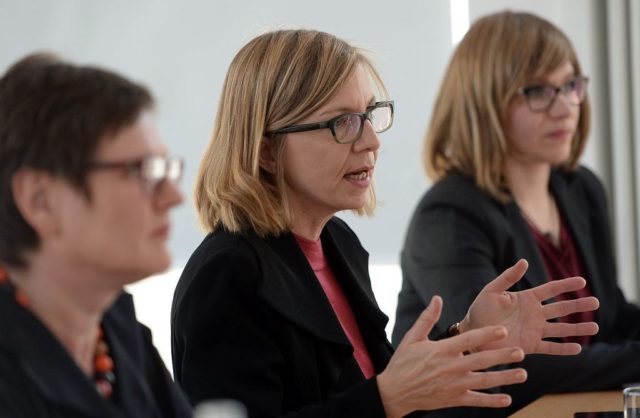
The non-profit organisation SISTERS – für den Ausstieg aus der Prostitution! e.V. is established in 2015 with headquarters in Stuttgart. At a press conference in Berlin on 28 September 2015, two board members – Sabine Constabel (social and community worker) and Leni Beymaier (trade unionist and SPD politician) as well as the former prostitute Huschke Mau – present their concept of how to fight against poverty and forced prostitution in Germany.
In March 2016, the cabinet of the SPD/CDU-led government passes a reform of the prostitution law. It calls, among other things, for the compulsory registration of brothel owners as well as prostitutes. However, other points that would have served to protect women forced into prostitution by poverty, pimps, and sex traffickers were not supported by the SPD – e.g., a minimum age of 21 or compulsory health insurance for prostitutes.
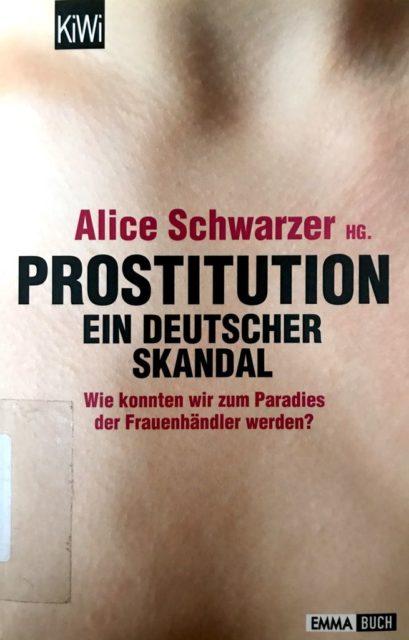
On 7 April 2016, the French national assembly passes a law that fully decriminalises prostitutes and makes the purchase of ‘sex services’ a punishable offence.30
Prostitution, and the trafficking of women that is inextricably connected to it, are held globally to be the most profitable businesses, even ahead of drug and arms trafficking. The rate of profit for brothel owners, pimps, and sex traffickers can be up to 1,000%. Behind the ideological debate about prostitution – voluntary or forced? not a problem or a scandal? – lie very substantial business interests. Just like in other industries, the prostitution lobby puts a great deal of pressure on politicians.
Nevertheless, countries like those in Scandinavia or France have decided to punish punters as buyers of ‘Ware Frau’ in order to thus dry up the market. Formerly pro-prostitution countries like the Netherlands have also been backpedalling for years.
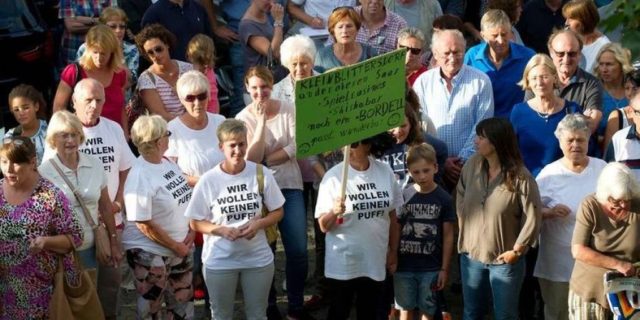
Germany takes a different, singular approach and has therefore become the “European hub of sex trafficking”. Even the reform of market deregulation for the protection of women working as prostitutes that was called for by opponents of prostitution for over 16 years and finally enacted in 2016 has virtually no effect. The debate, in other words, continues. Also, and not least, in the name of feminism.
References
1 Millett, Kate (1973): Das verkaufte Geschlecht. - München : Verlag Kurt Desch, p. 12f. (FMT Shelf Mark: SE.15.103).
See also: Schmackpfeffer, Petra (1989): Frauenbewegung und Prostitution : über das Verhältnis der alten und der neuen deutschen Frauenbewegung zur Prostitution. Oldenburg (FMT Shelf Mark: FE.03.115). - Retrieved from: http://oops.uni-oldenburg.de/655/1/688.pdf [PDF Document].
2 Röhr, Dorothea (1972): Prostitution : eine empirische Untersuchung über abweichendes Sexualverhalten und soziale Diskriminierung. - Frankfurt am Main : Suhrkamp (FMT_Signatur: SE.15.072).
3 Dirnen : Männer als Trophäen (1972). - In: Der Spiegel, Nr. 42, 09.10.1972, S.66-70, see Pressedokumentation Prostitution : Darstellung in der allgemeinen Presse ; Prostitution in der Geschichte (FMT Shelf Mark: PD-SE.15.03).
4 Millett, Kate (1973): Das verkaufte Geschlecht. - München: Verlag Kurt Desch, S. 105 (FMT Shelf Mark: SE.15.103).
5 § 184 StGB : Verbreitung pornographischer Schriften (1973). - Retrieved from: http://lexetius.com/StGB/184,12. See also Stümper, Alfred (1974): Maßnahmen zur wirksamen Bekämpfung der Zuhälterei. - In: Kriminalistik : Zeitschrift für die gesamte kriminalistische Wissenschaft and Praxis, Nr. 3, see Pressedokumentation: Prostitution : Politik und Justiz, Kapitel 2 Urteile und Prozesse, FMT Shelf Mark PD-SE.15.04).
6 Barbara ; Christine de Conick (1980): Die geteilte Frau. - Berlin : Lorez, p. 319 (FMT Shelf Mark: SE.15.009).
7 Biermann, Pieke (1984): Wir sind Frauen wie andere auch! Prostituierte und ihre Kämpfe. - Rowohlt : Reinbek, p. 220 (FMT Shelf Mark: SE.15.003).
8 Stolle, Peter (1979): Fernsehen: Guter Stehplatz. - In: Der Spiegel Nr. 47, 19.11.1979, see Pressedokumentation: Prostitution : Darstellung in der allgemeinen Presse ; Prostitution in der Geschichte (FMT Shelf Mark: PD-SE.15.03). - Retrieved from: http://www.spiegel.de/spiegel/print/d-39686059.html
9 Biermann, Pieke (1980): Sie hätten's wohl gerne so : Proteste gegen ZDF-Film. - In: Courage, Nr.1, S.42 f., see Pressedokumentation Prostitution : Darstellung in der allgemeinen Presse ; Prostitution in der Geschichte (FMT Shelf Mark: PD-SE.15.03). - Retrieved from: http://library.fes.de/cgi-bin/courage.pl?id=07.00697&dok=198001&f=198001_042&l=198001_043&c=198001_042
10 See Hydra e.V. - Geschichte einer Hurenorganisation. - Retrieved from: http://www.hydra-berlin.de/verein/geschichte/
11 Hydra Nachtexpress : Zeitung für Bar, Bordell u. Bordstein (1980) / Hydra Nachtexpress - o.V. : Berlin (FMT Shelf Mark: Z501).
12 Kraushaar, Elmar (1988): „Suchen spendablen Begleiter“. - In: Die Tageszeitung, 01.2.1988, see Pressedokumentation Prostitution : Prostituiertenorganisationen und Prostituiertenzeitungen (FMT Shelf Mark: PD-SE.15.01, Kap.10).
13 Ibid., P. 19.
14 Giesen, Rose-Marie ; Schumann, Gunda (1980): An der Front des Patriarchats : Bericht vom langen Marsch durch das Prostitutionsmilieu. - Bensheim: päd.extra Buchverlag, p. 183 (FMT Shelf Mark: SE.15.001).
15 Macht Prostitution frei? (1980). - In: Die Tageszeitung, 22.08.1980, see Pressedokumentation Prostitution : Prostituiertenorganisationen und Prostituiertenzeitungen (FMT Shelf Mark: PD-SE.15.01, Kap.1).
16 Not to be confused with the society agisra in Cologne, which was only established in 1993 (Informations- und Beratungsstelle für Migrantinnen und Flüchtlingsfrauen).
17 Tübinger Projektgruppe Frauenhandel (1989): Frauenhandel in Deutschland. - Bonn : Dietz, p. 172f. (FMT Shelf Mark: SE.15.028).
18 HWG : Zeitung für leichte und schwere Mädchen / HWG - Verein zur Förderung der Information und Kommunikation zwischen weiblichen Prostituierten. - Frankfurt/Main : Dr. im Eastside i.d.h. (FMT Shelf Mark: Z503).
19 1. Nationaler Prostituiertenkongress (1985). - In: Rotstift : Zeitschrift für Bar, Bordell, privat und Bordstein, November 1985, p.3f. (FMT Shelf Mark: Z502).
20 Kraushaar, Elmar (1988): „Suchen spendablen Begleiter“. - In: Die Tageszeitung, 01.2.1988, see Pressedokumentation Prostitution : Prostituiertenorganisationen und Prostituiertenzeitungen (FMT Shelf Mark: PD-SE.15.01, Kap.10).
21 Werner, Petra ; Röttger, Ulrike (1990): Beruf Hure: Legalize it! - In: igitte, Nr. 3, S. 7, see Pressedokumentation: Prostitution : Darstellung in der allgemeinen Presse ; Prostitution in der Geschichte (FMT Shelf Mark: PD-SE.15.03).
22 Grüne wollen mehr Rechte für Huren (1990). - In: Die Tageszeitung, 06.03.1990, see Pressedokumentation: Prostitution : Darstellung in der allgemeinen Presse ; Prostitution in der Geschichte (FMT Shelf Mark: PD-SE.15.03).
23 The report literally states: “Since only a very limited regulatory approach was chosen for the prostitution law, actually only a preliminary step was able to be taken with respect to the prostitution law’s aims - i.e., reducing related offences, improving of working conditions, facilitating leaving the profession, and achieving greater transparency in the red light district.” See: Bericht der Bundesregierung zu den Auswirkungen des Gesetzes zur Regelung der Rechtsverhältnisse der Prostituierten (Prostitutionsgesetz – ProstG) (2007). - Bundesministerium für Familie, Senioren, Frauen und Jugend [Hrsg.]. - Retrieved from: https://www.bmfsfj.de/blob/84046/f0c60f25ee8cd96f2560be3b070d7b05/bericht-bureg-auswirkungen-prostitutionsgesetz-data.pdf [PDF Document].
24 Prostitutionsgesetz: Ein halber Sieg! (2015). EMMA-News. - Retrieved from: http://www.emma.de/artikel/prostitutionsgesetz-ein-halber-sieg-330331
25 Prostitution : Ein deutscher Skandal (2013). Schwarzer, Alice [Hrsg.] - Köln: Kiepenheuer & Witsch, p. 328 (FMT Shelf Mark: SE.15.163).
26 Prostitution: ein deutscher Skandal ; wie konnten wir zum Paradies der Frauenhändler werden? (2013). - Schwarzer, Alice (Hrsg.). Köln : Kiepenheuer & Witsch. (FMT Shelf Mark: SE.15.163).
27 See Hydra e.V. - Geschichte einer Hurenorganisation. - Retrieved from: http://www.hydra-berlin.de/verein/geschichte/
28 The underlying Eurostat report with official data on prostitution was published in April 2013. - Retrieved from: http://ec.europa.eu/dgs/home-affairs/what-is-new/news/news/2013/docs/20130415_thb_stats_report_en.pdf [PDF Document].
29 Bericht über sexuelle Ausbeutung und Prostitution und deren Auswirkungen auf die Gleichstellung der Geschlechter (2013) : Plenarsitzung vom 03.02.2014, Berichterstatterin Mary Honeyball. - Europäisches Parlament/Ausschuss für die Rechte der Frau und die Gleichstellung der Geschlechter [Hrsg.]. - Retrieved from: http://www.europarl.europa.eu/sides/getDoc.do?pubRef=-//EP//TEXT+REPORT+A7-2014-0071+0+DOC+XML+V0//DE
30 Freierbestrafung in Frankreich (2016). - In: Kofra : Zeitschrift für Feminismus und Arbeit, Nr. 157 (FMT Shelf Mark Z-F041:2016-157).
All internet links were last accessed on 06.02.2018
Selective Bibliography
Documents online
18 Mythen über Prostitution - European Women's Lobby [Hrsg.]
Prostitution: Mythos und Wahrheiten - SISTERS – für den Ausstieg aus der Prostitution! e.V.
Recommendations
Röhr, Dorothea (1972): Prostitution : eine empirische Untersuchung über abweichendes Sexualverhalten und soziale Diskriminierung. - Frankfurt am Main : Suhrkamp (FMT Shelf Mark: SE.15.072).
Giesen, Rose-Marie ; Schumann, Gunda (1980): An der Front des Patriarchats : Bericht vom langen Marsch durch das Prostitutionsmilieu. - Bensheim : Päd.-Extra-Buchverlag (FMT Shelf Mark: SE.15.001).
Millett, Kate (1983): Das verkaufte Geschlecht: die Frau zwischen Gesellschaft und Prostitution. - Reinbek bei Hamburg : Rowohlt-Taschenbuch-Verl. (FMT Shelf Mark: SE.15.103).
Barry, Kathleen (1983): Sexuelle Versklavung von Frauen.- Berlin : Sub-Rosa-Frauenverl. (FMT Shelf Mark: SE.15.004).
Silvia Kontos (2009): Öffnung der Sperrbezirke : zum Wandel von Theorien und Politik der Prostitution. – Königstein/Taunus : Ulrike Helmer Verlag (FMT Shelf Mark: SE.15.140).
Prostitution : ein deutscher Skandal ; wie konnten wir zum Paradies der Frauenhändler werden? (2013). - Schwarzer, Alice [Hrsg.]. Köln : Kiepenheuer & Witsch (FMT Shelf Mark: SE.15.163).
FMT Press Documentation
Press Documentation on Prostitution: PDF-Download
The FMT press documentation is thematically structured and indexed. It comprises articles of the general public press, feminist press and other documents, such as leaflets and archival documents.
Selected FMT-Sources (lists)
FMT literature selection Prostitution: PDF-Download
EMMA article Prostitution: PDF-Download
Prostitutes magazine at FMT: PDF-Download
Related Topics
Pornography - Sexual Desire Vs. Sexualised Misogyny
Pornography - Sexual Desire Vs. Sexualised Misogyny
The feminist debate about pornography was divided: Some considered it unproblematic, but most opposed it as verbal and visual sexual violence. › mehr
Women Who Work: Housework and Claim for Equal Pay
Women Who Work: Housework and Claim for Equal Pay
When the women’s movement started, housework was still by law a woman’s job. Feminists fought successfully for the abolition of this law. › mehr
Law, Ruling and 'Male Justice'
Law, Ruling and 'Male Justice'
As the women’s movement got under way, law was almost exclusively administered by men. Feminists analyse that there is a “male justice” › mehr



